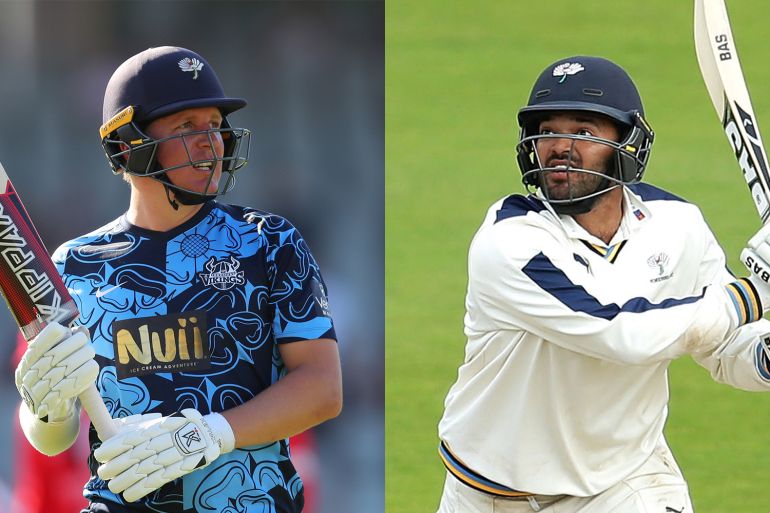Does English cricket have a racism problem?
Yorkshire County Cricket Club has come under fire for its lack of action after Azeem Rafiq complained of discrimination.

London, United Kingdom – When Pavitar Padam was younger, he asked his cricket club’s secretary how he could advance in the sport.
“Well, it helps if you’re white,” the secretary told him, a sardonic remark that made Padam feel like an outsider.
Keep reading
list of 4 itemsFlags, tears, anthem: How Afghans celebrated their cricket win
Politicians demand action over racism at top English cricket club
Cricket: India beat Afghanistan to keep T20 World Cup hopes alive
Now the financial adviser from Leeds, a northern English city in Yorkshire, coaches his eldest son’s cricket team.
The 13-year-old plays at a high standard, in a senior men’s team.
But Padam has been blunt with his son about the chances of success.
“You have to be twice as good,” he said, referring to ethnic minority players, compared with their white counterparts.
“There is a high percentage of ethnic minorities playing cricket from the South Asian community, but there’s very, very few getting through.”
While 30 percent of recreational cricket players across England and Wales have South Asian backgrounds, just 4 percent of professional cricketers are British Asian, according to English cricket’s governing body, the England and Wales Cricket Board (ECB).
Last year, when umpiring his son’s match, a minor dispute between Padam, who has Indian ancestry, and the opposing team’s umpire led to a racist outburst.
“[The other umpire] came towards me, right in my face, and he went, ‘You f****ing P*ki’.”
The use of that slur, a shorthand for Pakistani but spewed by racists to describe anyone of South Asian origin, has been at the centre of a national conversation recently, after Azeem Rafiq, a former player for Yorkshire County Cricket Club (YCCC), publicly shared his experiences of discrimination.
He was repeatedly called “P*ki” during his time at the club and the taunting was so demoralising that it led him to consider suicide.
An investigation recently found Rafiq a “victim of harassment and bullying” during his two stints with YCCC between 2008 and 2018, yet the top club dismissed the harassment as “friendly banter” between team players, and has said no action will be taken against his perpetrators.
Ex-England international Gary Ballance has admitted he used the slur towards Rafiq during his time at Headingley, the club’s home ground.
The issue has rattled several English politicians, including Member of Parliament Julian Knight, chair of the Digital, Culture, Media and Sport (DCMS) select committee, who tweeted on Tuesday that Rafiq’s case is “one of the most repellent and disturbing episodes in modern cricket history.”
YCCC lost Anchor butter as a sponsor, the dairy product company tweeting Tuesday, “There is never a place or an excuse for racism. We have no further activity supporting YCCC.”
Another major sponsor, The Emerald publishing group, will also review its partnership following the ECB’s investigation, The Guardian reported.
Many are now asking whether English cricket has a racism problem.
Taj Butt worked for the Yorkshire Community Foundation – which runs YCCC – between 2014 and 2017, as a community development officer.
He ultimately resigned because he felt the club had a “white, male-dominated” culture that was hostile towards ethnic minorities.
The only other ethnic minority who worked at the club’s stadium was introduced to him as “Steve”.
Butt later found out the employee had an African name that no one attempted to pronounce, so members had named him Steve.
Later, when Indian cricketer Cheteshwar Pujara played for the club, he too was referred to as Steve for the same reason.
“You had that culture where outsiders … you give them nicknames,” Butt told Al Jazeera. “It’s something you had to accept.”
When tasked with reaching out to the local South Asian community, he said the project was based on a “stereotypical” understanding of the group as “taxi drivers” and “restaurant workers.”
He wanted to bring more South Asian players into mainstream cricket, but the goal of the club’s operation was “simply [to] make sure that those people play cricket within their own areas”.
He said this strategy was not unique to Yorkshire, and lay some blame on the ECB.
“It’s a national issue,” he said. “That makes it an even bigger problem.”
Some observers said if a similar incident took place in football, it would be dealt with very differently.
“Football clubs have taken racism quite seriously in the past,” said Mustafa Mehmood, a lawyer and a FIFA football agent.
He explained there are more stringent regulations in place, lobbying by pressure groups, and that football counts a larger fanbase globally, making it harder to hide abuse.
With cricket, a “colonial mentality” is at play, said Mehmood.
“It was a colonial sport,” he said, adding that it spread through the UK’s former colonies, including those in South Asia.
“Some people have a chip on their shoulder … [that cricket] is an English sport for English people and maybe that’s why they don’t take [racism allegations] as serious.”
James Buttler, a sports journalist who worked as a press officer for YCCC from 2007 to 2010, said while Black players on England’s national team faced racism from fans during the Euros earlier this year, many team players took a knee before games, an indication of unity, anti-racism, and presenting themselves to the country as one, multiracial team.
Cricket lacks that united front, with wealthy, private-school-educated children dominating the sport, said Buttler.
Quoting former English cricketer Michael Carberry, a Black player he interviewed for his cricket-focused podcast Cricket Badger, Buttler said, “Racism is rife in cricket.”
Now, breaths are held for the outcome of investigations by the DCMS and ECB into Rafiq’s case.
Butt said that while it came as no surprise to British South Asians, Rafiq’s case has affected their sense of belonging.
“[We were] just looking forward to playing and watching cricket, especially with the World Cup going on,” he said.